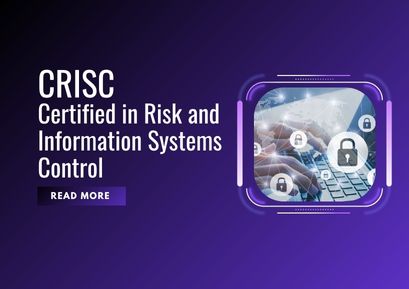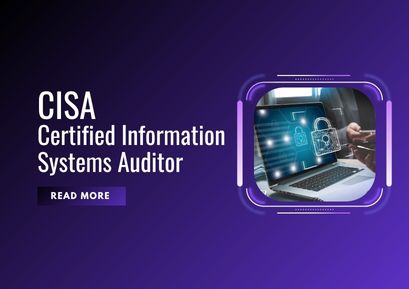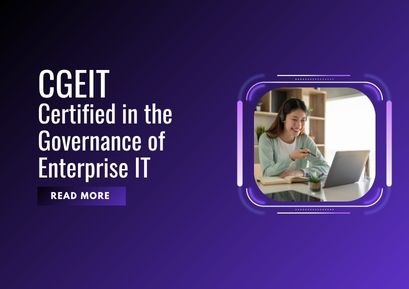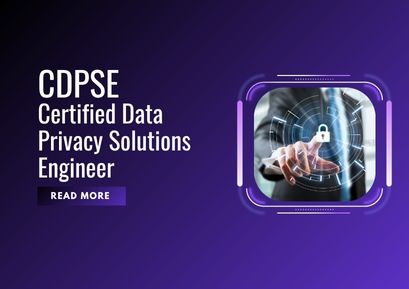Course Overview
The Certified Information Security Manager (CISM) certification is a globally recognized credential from ISACA, designed for professionals aspiring to excel in information security governance, risk management, and incident response at an enterprise level.
This course is structured to equip participants with the knowledge, tools, and frameworks needed to build, manage, and optimize security programs aligned with business goals. It’s the ideal path for IT professionals who want to transition from technical roles into strategic leadership positions within cybersecurity.
What You Will Learn
The CISM course is divided into four essential domains, each focusing on a key area of information security management:
- Module 1: Information Security Governance
- Module 2: Information Security Risk Management
- Module 3: Information Security Program Development & Management
- Module 4: Incident Management
What’s Included in the CISM Boot Camp
When you enroll in our ISACA CISM Certification Training Boot Camp, you get everything you need to succeed — from comprehensive study tools to post-class support and exam readiness guarantees.
✅ Your CISM Course Package Includes:
- 90-Day Extended Access: Revisit recorded classes and course materials for 90 days after your Boot Camp ends.
- 12-Month Access to ISACA Official QAE Database: Practice with the official ISACA Question, Answer & Explanation (QAE) tool — a must-have for CISM exam prep.
- 100% Satisfaction Guarantee: If you’re not satisfied, we’ll work to make it right — your success is our priority.
- Exam Pass Guarantee: We’re confident in your success — and we back it up with an exam pass guarantee.
- Official ISACA CISM Exam Voucher: Your certification exam fee is included with the course.
- Free 90-Day Infosec Skills Subscription: Unlock 1,400+ cybersecurity courses and labs to deepen your expertise.
- Knowledge Transfer Guarantee: If your employee leaves your organization, a replacement can attend the same course at no extra cost.*
- Pre-Study Learning Path: Get exam-ready before class starts with curated pre-study materials.
- Unlimited Practice Exam Attempts: Build confidence with unlimited access to simulated practice exams.
CISA Exam Details
| Exam Component | Details |
| Exam Name | Certified Information Security Manager (CISM) |
| Exam Type | Multiple Choice Questions (MCQs) |
| Total Questions | 150 |
| Passing Score | 450 out of 800 (Scaled Score) |
| Exam Duration | 240 minutes (4 hours) |
| Exam Language Options | English, Spanish, French, Brazilian Portuguese, Simplified Chinese, Japanese, Korean |
| Exam Provider | ISACA |
| Exam Registration | Via ISACA’s official website or authorized testing centers (e.g., PSI) |
| Certification Validity | 3 Years (renewable through Continuing Professional Education (CPE) credits) |
| Recommended Training | ISACA-accredited CISM Boot Camps, online courses, and official review manuals |
Who Should Take the CISA Course?
- Information Security Managers
- IT Auditors
- Risk Managers
- Chief Information Officers (CIOs)
- Chief Information Security Officers (CISOs)
- IT Consultants specializing in cybersecurity
- IT Directors and Managers
- Security Architects and Designers
- IT Professionals
- Data Protection Officers (DPOs)
- Privacy Officers
- Information Security Analysts
Curriculum
- 5 Sections
- 0 Lessons
- 4 Hours
- CISM Training Schedule – Day 1Module: Information Security Governance The first day of training focuses on building a strong foundation in information security governance, helping learners understand how to align security strategies with enterprise goals, establish policy frameworks, and secure executive buy-in. This module is critical for developing leadership skills in managing information security at an organizational level. ⏰ Morning Session: Core Concepts of Information Security Governance Key principles of information security and its role in business continuity Relationship between security initiatives and business operations Techniques to gain senior management support for security programs Methods to integrate information security within enterprise governance frameworks Crafting enterprise-wide security policy directives with top management involvement Structure and responsibilities of information security steering committees Defining roles, responsibilities, and reporting lines in security management Governance coverage areas: Risk management Data classification Network and system access controls Comparison of centralized vs. decentralized security models 🕑 Afternoon Session: Compliance, Strategy & Security Program Development Legal and regulatory considerations in global data transfers, online businesses, and encryption (e.g., GDPR, data localization laws, IP protection) Understanding cybersecurity insurance coverage and related terms (e.g., business interruption, fidelity insurance) Recordkeeping requirements and regulatory compliance mandates Aligning security policies with business objectives Components of a well-defined information security program (policies, procedures, guidelines) Creating a process improvement model for scalable security programs Integrating security architecture development with process modeling and infrastructure planning Applying international standards for security governance (e.g., ISO/IEC 27001, COBIT, NIST CSF) Performing a cost-benefit analysis for security investments Building a business case with value propositions and transformation roadmaps Organizational alignment Change management Competitive benchmarking Architectural planning 🌙 Evening Session: Self-Study & Group Exercises (Optional) Review of key governance frameworks Practice case studies: Developing a policy directive and business case Peer discussion: Centralized vs. decentralized security governance Mock questions from Domain 1 of the CISM exam0
- CISM Training Schedule – Day 2Module: Information Security Risk Management On Day 2, participants will dive deep into risk management, a critical discipline within information security governance. This session equips learners with the skills to identify, assess, and mitigate risks affecting enterprise information assets, and implement strategic controls based on business priorities and threat exposure. Shape ⏰ Morning Session: Foundations of Risk Management in Information Security Understanding the role of information assets in business operations Introduction to valuation methods for information resources Principles and practices of data classification based on sensitivity and impact Establishing baseline security controls as part of risk-based assessments Applying lifecycle risk management across IT systems and services Identifying and analyzing threats, vulnerabilities, and exposures related to: Confidentiality Integrity Availability of critical information assets Shape 🕑 Afternoon Session: Risk Assessment Techniques & Mitigation Planning Performing qualitative and quantitative risk assessments Evaluating sensitivity and criticality of assets to predict business impact Using gap analysis to compare current controls with best practices (e.g., ISO 27001, NIST, COBIT) Determining Recovery Time Objectives (RTOs) for various systems and services Aligning RTOs with business continuity and disaster recovery planning Exploring risk treatment strategies: Risk avoidance Risk transfer Risk reduction Risk acceptance Conducting cost-benefit analysis to prioritize security investments Techniques to track, manage, and report risk remediation progress Shape 🌙 Evening Session: Self-Study & Peer Collaboration (Optional) Case study discussions: Performing a risk assessment Exercises: Setting RTOs for mission-critical systems Practice questions from Domain 2 of the CISM exam Peer review of risk register and reporting formats0
- CISM Training Schedule – Day 3Module: Information Security Program Development & Management On Day 3, participants will focus on designing, building, and managing enterprise-wide information security programs. The session highlights how to align security initiatives with business goals, integrate governance frameworks, and implement strong technical and administrative controls. ⏰ Morning Session: Building an Effective Security Program Developing and executing a security implementation plan aligned with risk analysis results Applying project management methodologies to security initiatives Establishing a robust information security governance framework across the enterprise Integrating security principles and awareness across business units and departments Designing security baselines and configuration management practices for applications and infrastructure Leveraging modern security architectures: Single Sign-On (SSO) Role-based vs. rule-based access control Restricted system administration privileges Evaluating security technologies including: Cryptographic techniques Digital signatures Appropriate control selection strategies Defining procedures and guidelines to embed security into business operations 🕑 Afternoon Session: Security Integration & Program Management Understanding various Systems Development Life Cycle (SDLC) approaches, including traditional and agile/prototyping models Planning and executing security testing, followed by structured reporting and action plans Assessing compliance of applications and infrastructure with the enterprise security framework Implementing effective administrative, physical, and technical controls Embedding security requirements into business processes during design and development Creating and managing security metrics to measure program effectiveness Navigating vendor and acquisition management, including: Evaluating third-party Service Level Agreements (SLAs) Contract preparation and negotiation 🌙 Evening Session: Optional Study & Collaboration Group discussion: Designing an enterprise security program Hands-on activity: Mapping SDLC phases with security checkpoints Practice Q&A from CISM Domain 3 Peer review of security implementation case studies0
- CISM Training Schedule – Day 4Continuing Domain 3: Information Security Program Development & Management Day 4 dives deeper into the strategic and operational aspects of managing enterprise information security. From implementing security programs via third parties to handling change management, monitoring KPIs, and building a strong security culture, this session focuses on sustainable program governance and operational excellence. ⏰ Morning Session: Operationalizing Security Programs Translating information security policies into day-to-day operational procedures Administering security through defined processes and procedures Managing third-party implementations including: Trading partners Security service providers Continuously monitoring security operations and activities across infrastructure and applications Leveraging Key Performance Indicators (KPIs) to assess the success of security investments Executing change and configuration management to ensure consistency and control Conducting due diligence reviews of infrastructure and controls Collaborating with internal/external assurance providers during audits and security reviews 🕑 Afternoon Session: Sustaining & Improving Security Programs Applying due diligence standards for managing and controlling access to information resources Monitoring external vulnerability intelligence sources to update internal security posture Handling events that impact security baselines, triggering updates to: Security plans Test strategies Risk reassessments Implementing security problem management processes to identify, track, and resolve issues Embracing the role of security managers as facilitators, educators, and internal consultants Understanding how cultural and social norms affect user behavior toward security practices Designing interventions to positively influence user behavior and culture Creating and delivering impactful security awareness and training programs 🌙 Evening Session: Optional Study & Peer Collaboration Group case study: Managing outsourced security operations Scenario-based quiz: Responding to changes in security baselines Peer discussion: Cultural impact on security program success Guided review of CISM Domain 3 practice questions0
- CISM Training Schedule – Day 5Domain 4: Information Security Incident Management On the final day of the boot camp, learners explore the critical domain of incident management. This session equips professionals with the knowledge and tools required to plan for, respond to, and recover from security incidents while preserving business continuity and ensuring compliance with legal and forensic standards. ⏰ Morning Session: Building Resilient Incident Response Programs Core components of an effective incident response capability Implementing emergency management procedures for information security incidents, including: Production change control Establishing a Computer Emergency Response Team (CERT) Strategies for disaster recovery planning and maintaining business continuity Techniques for testing disaster recovery plans across infrastructure and mission-critical applications Designing escalation processes for timely and efficient incident handling 🕑 Afternoon Session: Detection, Response & Post-Incident Analysis Crafting and enforcing intrusion detection policies and processes Help desk integration for: Identifying potential security incidents Distinguishing security issues from routine user problems Automated alert and recovery mechanisms, including real-time virus outbreak responses Legal and evidentiary requirements in incident response: Rules for admissibility Quality and chain of custody of digital evidence Conducting post-incident reviews, lessons learned, and procedural improvements Creating a feedback loop for continuous enhancement of the incident response plan 🌙 Evening Session: Wrap-up & Study Planning Group activity: Simulated incident response scenario Discussion: Incident escalation failures and how to avoid them Final Q&A with the trainer Personalized preparation roadmap for the CISM exam Review of official ISACA CISM QAE questions and exam strategy tips0





